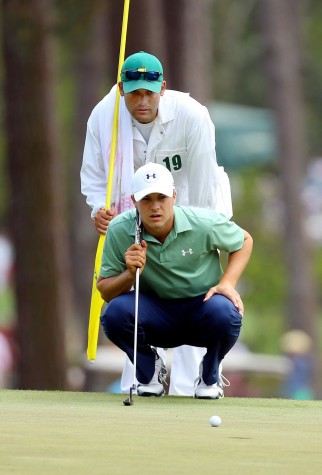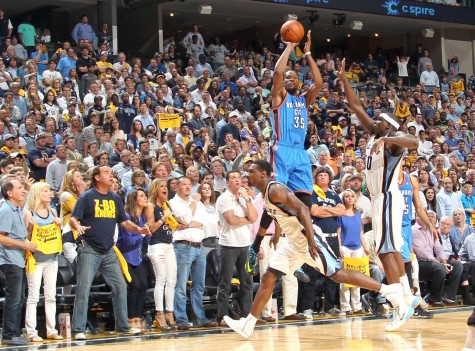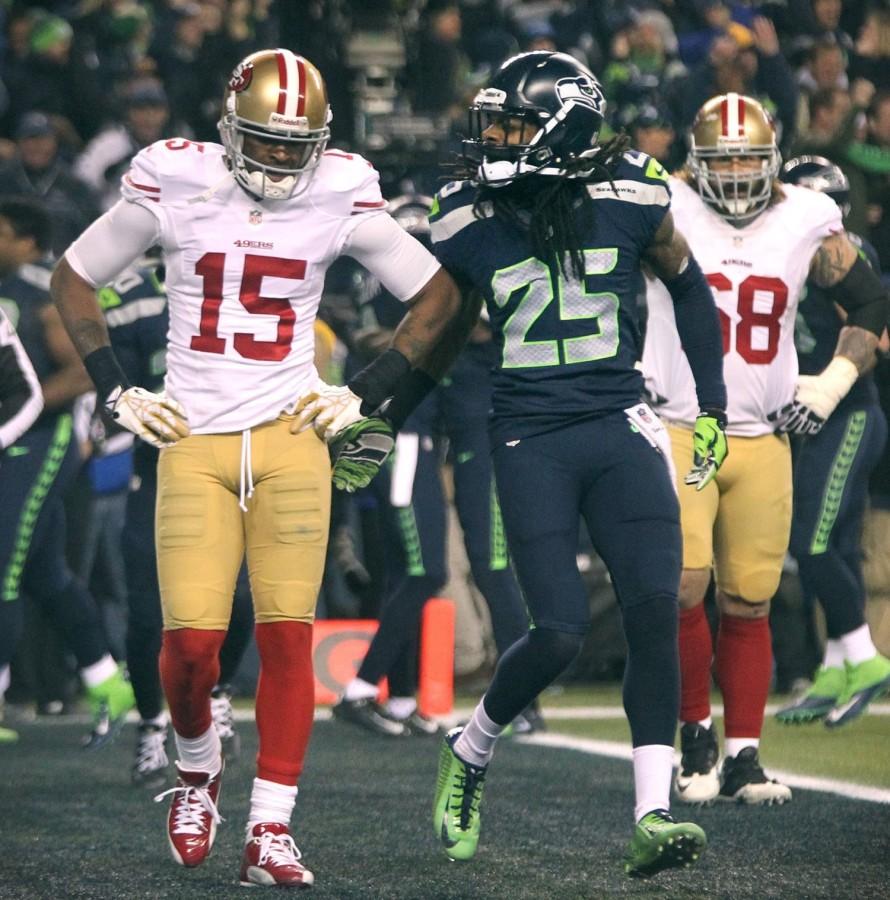Whatever happened to humility in sports?
Seattle Seahawks cornerback Richard Sherman rubs in the defeat after knocking away a pass from San Francisco wide receiver Michael Crabtree (15) in the NFC championship game at CenturyLink Field in Seattle on Sunday, Jan. 19, 2014. The Seattle Seahawks defeated the San Francisco 49ers, 23-17. (Tony Overman/The Olympian/MCT)
May 13, 2014
“You have to demand things and believe you’re worth more. And once you do demand them, you’re usually going to get them. The players who first came in were very humble because we came from obscurity. Today’s players, on the other hand, have a sense of entitlement,”-Sue Wicks
What happened to humility in sports, let alone our everyday lives? I’m not saying the world is filled with immoral people or, on the other hand, that everyone has to be Captain America. We need more modest athletes who have the craftsmanship to set the bar high for the next generations.
In my eyes, Richard Sherman’s uncalled-for post-game rant after the NFC Championship game was very disturbing and disappointing to watch.
It began with Sherman deflecting a pass that was intended for 49ers receiver Michael Crabtree in the end zone, and Seattle intercepted it to seal the victory. After the game, Fox reporter Erin Andrews asked Sherman to give his insight on the final play of the game.
He responded with a crass, “Well, I’m the best corner in the game! When you try me with a sorry receiver like Crabtree, that’s the result you gonna get! Don’t you ever talk about me!”
Sherman’s interview went viral, sparking a debate on whether those were the right words to say moments after Seattle advanced to Super Bowl XLVIII.
The whole world (or at least millions of football fans) saw Sherman call attention to himself instead of emphasizing the team’s effort. Sherman could have said, “It was a great team effort tonight. Our coaching staff called the right play at the right time, and I happened to be there to deflect the pass.” Instead, Sherman put himself before his team and bluntly called out Michael Crabtree, who I think is a respectable wide receiver for the San Francisco 49ers.
Sherman is known for taunting players, including Washington Redskins cornerback Deangelo Hall and New England Patriots quarterback Tom Brady. Hall and Sherman got into a tussle on Twitter. Hall tweeted, “Following wide receivers can be bad for your health if you really aren’t a killer!” and Sherman commented on Hall’s tweet with “Been tough on you huh lol,” which then ignited a back-and-forth heated public conversation.
There is no place in our society for people, especially first-class athletes creating high school drama. Darrell Green acted the role of sensible adult in the Twitter fight when he said, “Let’s start building each other up for a change, our kids need that and deserve that from us!”
Green is right.
The influence athletes have children is astonishing, and how is that affecting our future generation of athletes?
A study from the Kaiser Family Foundation (via abcnews.go.com) shows that kids ranked famous athletes among the most admired people in their lives (73 percent) second only to their parents (92 percent). Seventy-four percent of kids said that it is common for sports figures to yell at officials and sixty-two percent believe that it is common for sports figures to talk “trash” or taunt the other opponent.
Everyone has role models. I look up to professional golfer Jordan Spieth because of the way he handles himself in the spotlight at such a young age (20-years old). Spieth grew up in a middle-class Dallas neighborhood and turned pro back in 2012. Sure, Spieth had a sparkling amateur resume, but when he first started out on the PGA TOUR he had no status and nowhere to call home.

“I haven’t done anything yet, I have to prove myself,” said Spieth after he made his first start on the PGA TOUR. Spieth is the only player other than Tiger Woods (who has had his fair share of issues) to win multiple U.S. Junior titles. Going into 2013, Spieth had no status and very few expectations. He finished the year as the PGA TOUR Rookie of the Year and one of the top-25 players in the world. Spieth picked up his first career win in the 2013 John Deere Classic at nineteen. Winning in a 5-hole playoff against David Hearn and Zach Johnson, he became the youngest winner on tour in 82-years.
“I didn’t think it would happen this early. I had a plan. I guess the plan got exceeded,” Spieth said after his first career PGA TOUR win.
Spieth carried on his remarkable 2013 season into 2014 and The Masters, where he led most of the weekend but couldn’t close the deal, finishing second to Bubba Watson. The Masters is the Super Bowl of golf tournaments. Not too many twenty-year olds can handle finishing second the way Jordan Spieth did.
The thing that caught my eye about Spieth is that he respected the more mature competitors around him and didn’t try to climb on top of a pedestal. More kids need to look up to guys like Jordan Spieth.
With fame at such a young age, I hope Spieth does not crack like Tiger Woods. Woods got involved in a personal scandal, having numerous of affairs. He had a wife and kids and was dominating the golf world. Woods’ golf game fell-apart and his career will never be fully recovered. And all of this happened in the public eye, and Woods had to take a leave of absence to rehabilitation. Now, it seems like every athlete gets a pass on bad behavior if he apologizes and moves on. I’m not so sure.
I am a huge fan of Oklahoma City Thunder small forward Kevin Durant. He is one of the best at what he does, and it just doesn’t get more humble than KD. Durant was awarded the 2014 Most Valuable Player in the NBA and gave an awe-inspiring acceptance speech by paying a tribute to his mom.

“One of the best memories I had is when we moved into our first apartment. No bed, no furniture, and we just all sat in the living room and hugged each other, ‘cause that’s when we all thought we made it,” said Durant to his mother, fighting back the tears. “You made us believe. You kept us off the street. You put clothes on our backs, food on the table. When you didn’t eat, you made sure we ate. You sacrificed for us. You’re the real MVP.”
Durant didn’t call out LeBron James saying, “look at me, I’m better than you” or say anything to suggest superiority. Instead he embraced the ones that got him to where he is today.
We need more athletes and role models who strive to be humble in victory and gracious in defeat. Humble yourself when your face gets put on the front of the newspaper. Let kids be kids and play sports for the joy and not the money or the fame. Everyone could use a piece of humble pie, and we, as athletes, parents, students, and coaches, need to realize that one of the most important traits to have wherever you go in life is humility.



